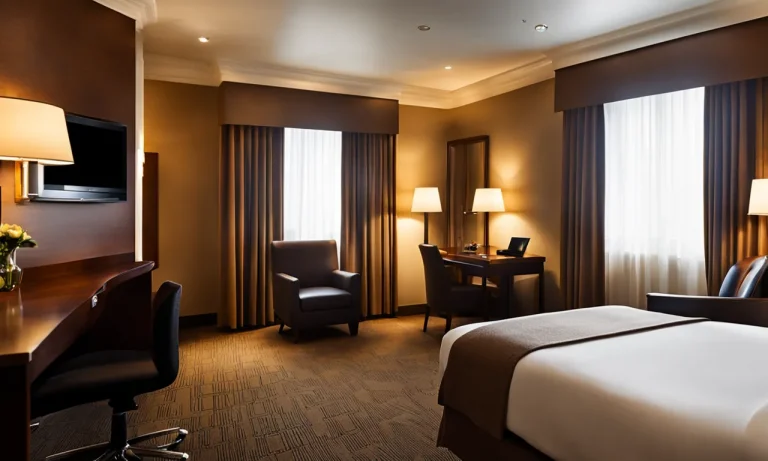If you’re planning a vacation or a business trip, you might be wondering if hotel prices go down closer to the date of your stay. The answer is not straightforward, as it depends on various factors.
If you’re short on time, here’s a quick answer to your question: Hotel prices can go down closer to the date, but it’s not always the case.
In this article, we’ll explore the different factors that affect hotel prices, the best time to book a hotel, and some tips on how to save money on your next hotel stay.
Factors Affecting Hotel Prices
Hotel prices can vary greatly depending on a number of factors. Here are some of the main factors that can affect the price of a hotel room:
Location
The location of the hotel can have a major impact on the price you pay. Hotels in popular tourist destinations or in city centers tend to be more expensive than those in less popular areas.
For example, a hotel in Times Square in New York City will generally be more expensive than a hotel in a suburb of the same city.

Season
The time of year you are traveling can also affect hotel prices. In general, hotels are more expensive during peak travel seasons such as summer or major holidays.
If you are able to travel during the off-season, you may be able to find better deals on hotels.
Events
If there is a major event or conference happening in the city you are traveling to, hotel prices will likely be higher.
For example, if there is a big music festival or sporting event happening, hotel prices may be inflated. It’s a good idea to check the event calendar for your destination and plan accordingly.
Hotel Chain
The hotel chain you choose can also affect the price you pay. Luxury hotels will generally be more expensive than budget chains, but they may offer more amenities and a higher level of service.
It’s important to consider your budget and your needs when choosing a hotel chain.
Room Availability
The availability of rooms can also affect the price you pay. If there are only a few rooms left in a hotel, the price may be higher than if there are plenty of rooms available.
It’s a good idea to book your hotel room in advance to ensure the best price. Keep these factors in mind when booking your next hotel stay to help you find the best deal.

When to Book a Hotel
Booking a hotel can be tricky. You want to find the best deal possible, but you also want to make sure you have a comfortable and enjoyable stay.
One of the biggest questions people have when booking a hotel is when to do it. Should you book months in advance or wait until the last minute? And do hotel prices go down closer to the date?
Weekdays vs. Weekends
If you’re looking to save money on a hotel room, you may want to consider booking on a weekday rather than a weekend. This is because many hotels have higher rates on weekends when they are busier and have more demand. In contrast, weekdays are generally slower, so hotels often offer lower rates to attract guests.
According to a study by CheapHotels.org, the average hotel rate in major cities across the United States was 20% cheaper on weekdays compared to weekends. So, if you’re flexible with your travel dates, booking a hotel for a weekday stay could help you save some money.
Months in Advance
Another consideration when booking a hotel is how far in advance to do it. While some people like to book months in advance to secure their accommodations, others prefer to wait until closer to the date.
So, which is better? It turns out that booking in advance is usually the way to go if you want to save money.
According to a study by TripAdvisor, the best time to book a hotel is within two months of your travel dates. This is when hotel prices are typically at their lowest. Waiting until the last minute can actually end up costing you more since hotels will often raise their rates as the date approaches.
Last Minute Bookings
While booking in advance is generally recommended, there are some cases where last-minute bookings can be a great way to save money. If a hotel has a lot of vacancies and is struggling to fill their rooms, they may offer last-minute deals to entice people to book.
If you’re comfortable with a bit of uncertainty and don’t mind waiting until the last minute, websites like HotelTonight can help you find great last-minute deals. However, keep in mind that this strategy can be risky, and you may not end up with the accommodations you were hoping for.
| Booking Strategy | Pros | Cons |
|---|---|---|
| Booking on a weekday | Lower rates due to less demand | May not work if your travel dates are fixed |
| Booking in advance | Lower rates due to early bird discounts | May not work if your plans change |
| Last-minute bookings | Potential for great deals | Risky – may not get the accommodations you want |
Ultimately, when to book a hotel depends on your personal preferences and travel plans. However, by considering factors like weekdays vs. weekends, months in advance, and last-minute bookings, you can make a more informed decision and potentially save some money on your next hotel stay.
How to Save Money on Hotel Stays
If you’re planning a trip, finding affordable accommodation is crucial to keeping your travel budget on track. Here are some tips on how to save money on hotel stays:
Sign Up for Loyalty Programs
Many hotel chains offer loyalty programs that allow members to earn points or rewards for their stays. These rewards can then be redeemed for free or discounted hotel stays.
By signing up for these programs, you can save money on future hotel stays. Additionally, loyalty program members may also receive exclusive discounts or offers.
Use Price Comparison Websites
There are many websites that allow you to compare hotel prices from various booking sites.
By using these comparison sites, you can easily find the best deals on hotels. Some popular price comparison websites include Booking.com, Expedia, and Hotels.com.
Negotiate with the Hotel
If you’re booking directly with a hotel, don’t be afraid to negotiate the price. Hotels may be willing to offer a discount or upgrade if you ask. Additionally, if you’re booking during the off-season or during a slow period, hotels may be more willing to negotiate prices.
Consider Alternative Accommodations
Hotels aren’t your only option for accommodation. Consider alternative options such as hostels, vacation rentals, or even camping. Hostels can be a great budget-friendly option for solo travelers or those on a tight budget.
Vacation rentals, such as Airbnb, can provide a more homey feel and may be more affordable than a hotel. Camping can also be a fun and budget-friendly option for those who enjoy the outdoors.
| Website | Pros | Cons |
|---|---|---|
| Booking.com | Large selection of hotels, easy to use interface | May not always have the best deals, fees may apply |
| Expedia | Offers flights and car rentals in addition to hotels, rewards program | May not always have the best deals, fees may apply |
| Hotels.com | Offers a rewards program, price match guarantee | May not always have the best deals, fees may apply |
Pro tip: When booking a hotel, be sure to read the fine print carefully. Many hotels have cancellation policies or resort fees that may affect the overall cost of your stay.

Conclusion
In conclusion, hotel prices can go down closer to the date, but it’s not always guaranteed. Several factors affect hotel prices, including location, season, events, hotel chain, and room availability.
The best time to book a hotel depends on various factors, such as weekdays vs. weekends, months in advance, and last-minute bookings.
To save money on your next hotel stay, consider signing up for loyalty programs, using price comparison websites, negotiating with the hotel, or considering alternative accommodations.
By following these tips, you can save money on your next hotel stay and make the most out of your trip. Happy travels!






